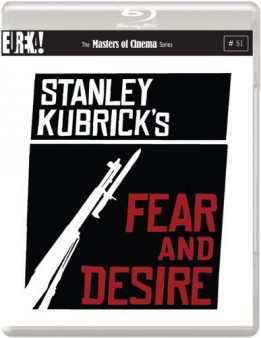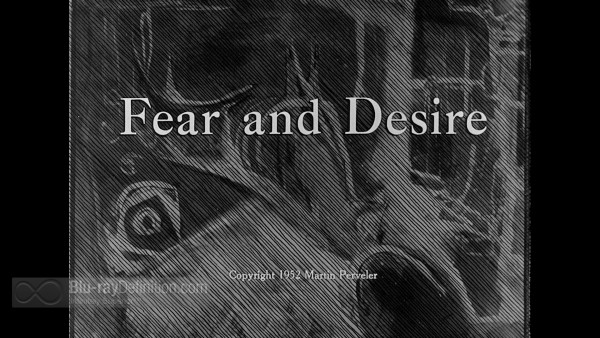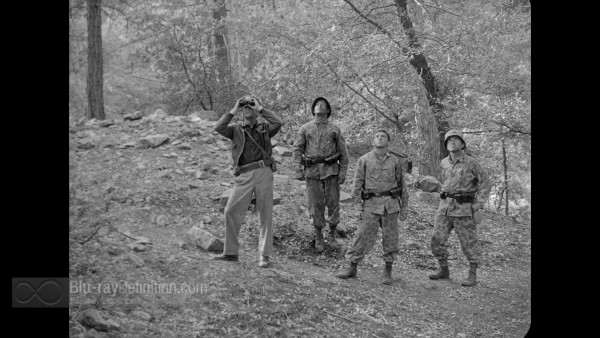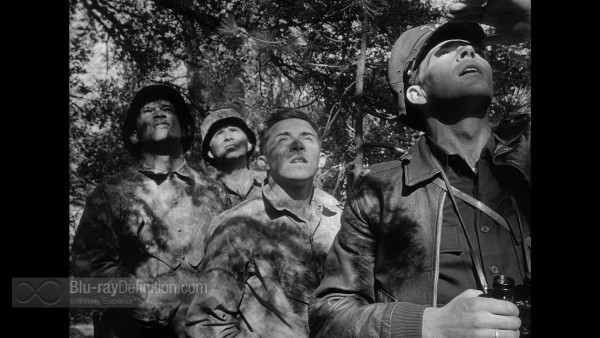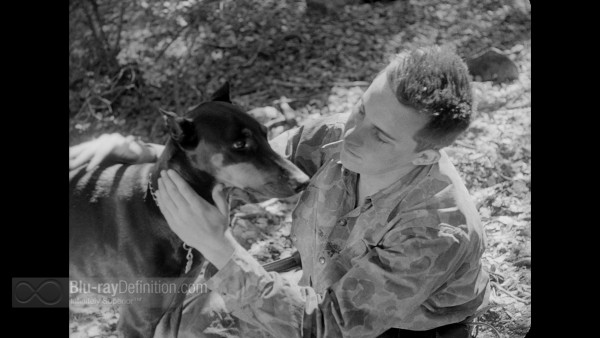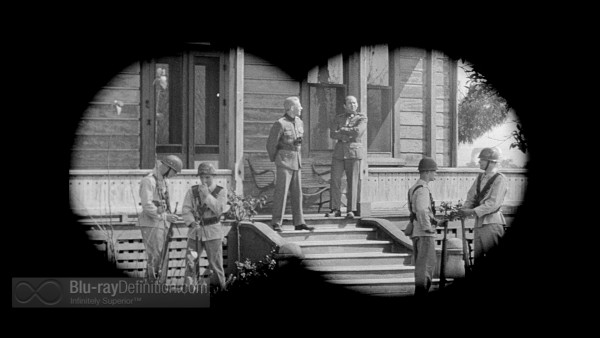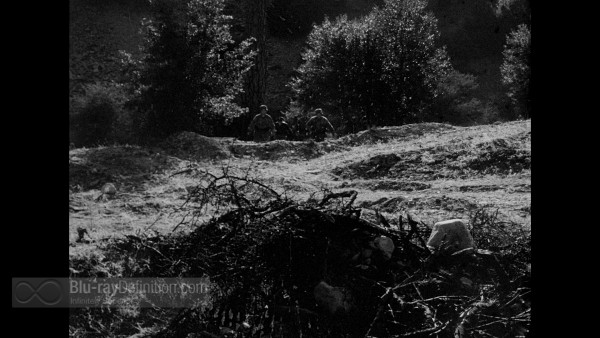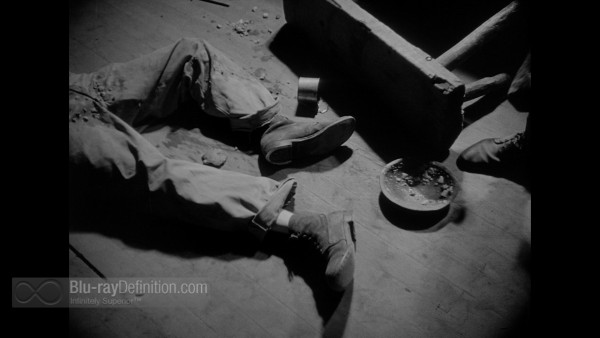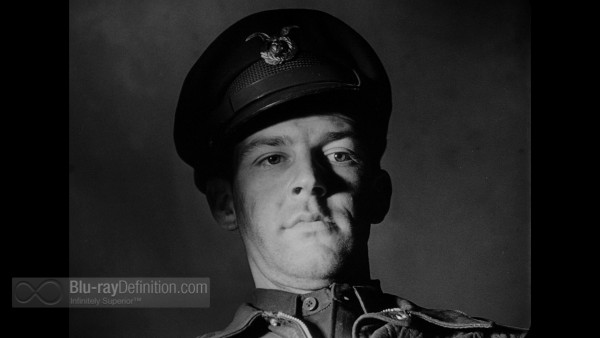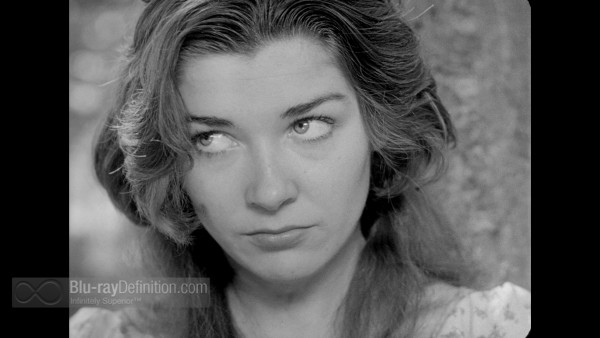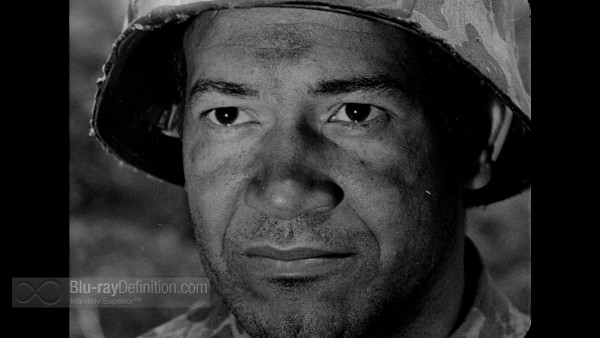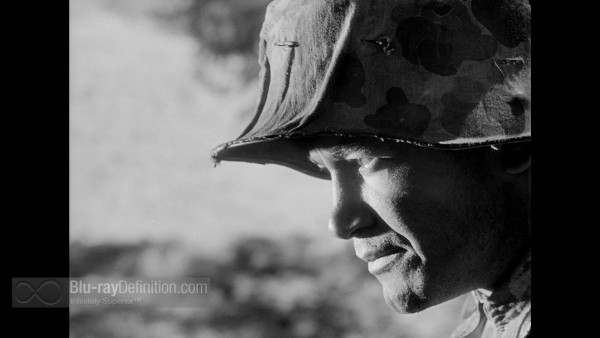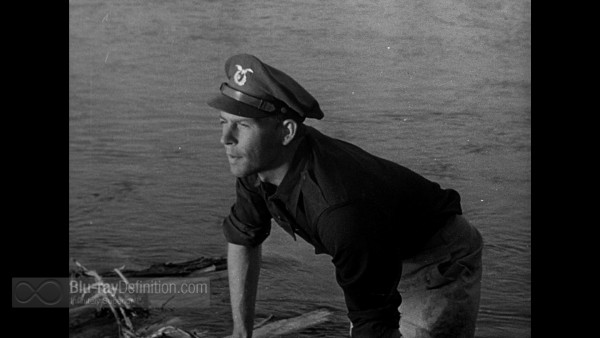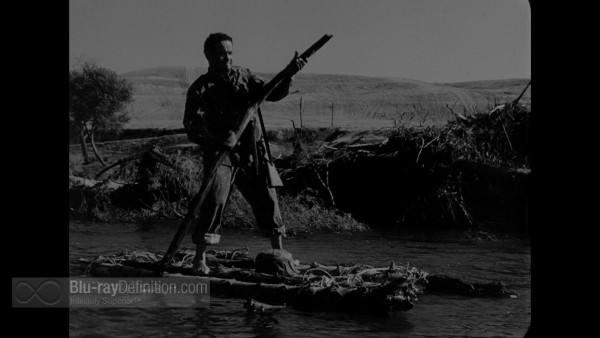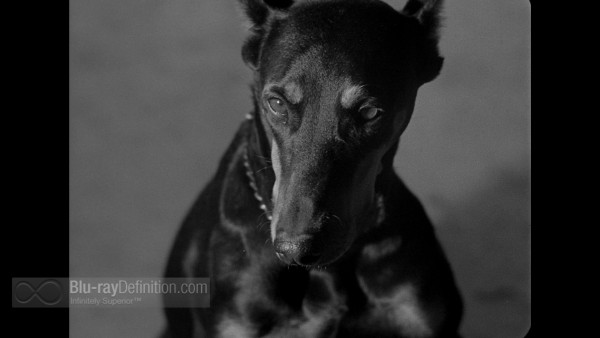- Aspect Ratio: 1.37:1
- Video Codec: AVC/MPEG-4
- Resolution: 1080p/24 (23.976Hz)
- Audio Codec: English LPCM 2.0 (48kHz/16-bit)
- Subtitles: English SDH
- Subtitles Color: White
- Region: B (Region-Locked)
- Certification: 12
- Run Time: 62 Mins.
- Discs: 1 (1 x Blu-ray)
- Studio: Eureka Entertainment
- Blu-ray Release Date: January 28, 2013
- RRP: £20.42
–
Overall
[Rating:3.5/5]
The Film
[Rating:3.5/5]
Video Quality
[Rating:3.5/5]
Audio Quality
[Rating:4/5]
Supplemental Materials
[Rating:4/5]
Click thumbnails for high-resolution 1920X1080p screen captures
(All TheaterByte screen captures are lightly compressed with lossy JPEG at 100% quality setting and are meant as a general representation of the content. They do not fully reveal the capabilities of the Blu-ray format)
–
The Film
[Rating:3.5/5]
Auteur screenwriter and director Stanley Kubrick’s debut feature Fear and Desire (1953) may not reach the heights of his later works, but as a first attempt, the film is a remarkable achievement given the budget constraints and historical factors. Working with a tight knit group of friends, Kubrick crafted Fear and Desire in a way that would be very reminiscent of the burgeoning independent and world cinema/new wave scene of the day. Even more boldly,during post-World War II boom era of the United States, the Cold War and the very real, visceral Korean War; and as the black list era was beginning, Kubrick’s film was a cold, solemn look at the realities of war’s effect on the men who had to fight them. He shied away from glorifying or boiling it down to simple platitudes like ‘good versus evil’ or elevating soldiers to the level of supermen. Instead, in Fear and Desire, with a screenplay from his high school friend Howard Sackler – who would later win a Pulitzer Prize for his play The Great White Hope (1970) – the story involves itself with, as the title suggests, the inner turmoil of flawed men, the class distinctions within society itself that work their way onto the battlefield, and sexual frustration. With this being Kubrick’s first feature, it’s inevitable that we would parse the visual and prosaic language to find the stylistic connections between the early filmmaker and the later master. No one film would come as close thematically in Kubrick’s catalogue to exploring these same themes as Full Metal Jacket (1987), albeit much more elegantly than its predecessor.
At the heart of Fear and Desire is the story about a lost regiment in an unnamed war on an unnamed island, one gun between them, trying to make their way back to their base. The four men, all from different walks of life, find more difficulties amongst themselves and collaborating as a cohesive unit, it seems, than they do with fighting the mostly invisible enemy in the harsh jungle they are forced to traverse. More problems arise when they happen upon a beautiful woman (Virginia Leith) they take hostage, tying her to a tree. She evokes sexual tension and lust amongst the men, in particular Pvt. Sidney (Paul Mazursky), who begins to have a nervous breakdown while guarding the desirous maiden. It’s one of the more over-the-top, awkwardly acted scenes of the film, which is hampered by Kubrick’s rookie mistake to synchronize all the audio in post-production. None of the audio was recorded during filming, and this added many constraints, especially in the foley effects which were looped and the voice acting which sounds, many times, like it is being forced.
Fear and Desire has always suffered from mixed reviews over the course of its lifetime, falling into near obscurity since its release some two years after it was filmed. The harshest critic of all was Kubrick himself who labelled it “amateurish.” While the film never rises to the level of brilliance that Kubrick’s later works would, it suffers from having his name attached to it the most. It is a film of its time, from an American filmmaker heavily influenced by world cinema, breaking out of the Hollywood moral code. The running dialogue and narration from Sackler is often highly poetic to the point of being fairly pretentious. This can be detrimental at times where it is clearly not needed, at other times, it works so well it is a thing of beauty. So is the cinematography from Kubrick, who was working with a camera he’d never used before, yet he was able to achieve some remarkable, almost surreal imagery. In the “fog of war” effect, that many compare to the then recently released Rashomon Kurosawa, or the gorgeous silhouetted shots of Sgt. Mac (Frank Silvera) rafting down the river, one can already see Kubrick’s influence on filmmaker’s to come, in the visuals of Apocalypse Now, from Coppola, for example.
Fear and Desire, despite its flaws and strengths, still must be set aside from the rest of the Kubrick works and taken in on its own account. People will either love it or hate it, there’s very little middle ground here. Personally, as an opening statement from a remarkable filmmaker, I find it to be quite an achievement.
Video Quality
[Rating:3.5/5]
This Masters of Cinema transfer was officially licensed from Kino Lorber, Inc. from a restoration by The Library of Congress. It’s an AVC/MPEG-4 encodement of the film’s original 1.37:1 35mm black and white source. While the restoration is strong in parts and retains a film-like appearance, it does suffer from a lot of speckling straight through, and some shots really break down, showing heightened levels of grain, scratches, and tramlines. The detail can be very strong, with lots of texture, inky blacks, and great contrast, but then it softens, becomes washed out and texturally diffuse. Perhaps the source was really in bad shape, but the Library of Congress’ restoration at least steers clear of any heavy-handed processing such as DNR and edge enhancement.
Audio Quality
[Rating:4/5]
Kubrick famously made a big goof by filming Fear and Desire silently, without any on-location sound recording equipment, thinking it would be less expensive to synchronize the dialogue and effects later. That turned out to be miscalculation, both financially and, to an extent, artistically. From strictly an audiophile point of view, the sound arguably has some of the best quality you will hear on a film from the era. Apart from some mild sibilant distortions on the dialogue and a little bit of the ol’ analogue hiss, the dialogue and narration is fuller and more natural in sound as are the numerous foley effects. The monaural track is provided here in LPCM 2.0 (48kHz/16-bit) with English SDH subtitles.
Supplemental Materials
[Rating:4/5]
The interesting look into the beginning of Stanley Kubrick’s career as a filmmaker continues with the inclusion of three of his early short films. A fifteen-minute interview with Kubrick scholar Bill Krohn is also included and is a must-watch featurette.
The supplements:
- Stanley Kubrick’s Short Films:
- Day of the Fight (1951; 1.37:1; 1080p/24; 00:12:35)
- Flying Padre (1951; 1.37:1; 00:08:37)
- The Seafarers (1953; 1.37:1; 00:28:55)
- Bill Krohn (1.78:1; 1080p/24; 00:15:25) – Interview with film critic and Kubrick scholar Bill Krohn, filmed in Los Angeles in November 2012.
- Booklet: The thick booklet includes a lengthy, in-depth essay on Fear and Desire and, to a lesser extent, the three short films included here, Day of the Fight, Flying Padre, and The Seafarers, by James Naremore, Professor Emeritus at the Department of Communication & Culture at Indiana University at Bloomington. Also included is a statement on the film by Kubrick himself, rare production stills, cast & crew credits, disc credits, and viewing information.
The Definitive Word
Overall:
[Rating:3.5/5]
Kubrick may have been embarrassed by this first feature of his, but Fear and Desire is a film that deserves a second, or third look, a reassessment about its place in film history. There is some beautiful imagery and moving prose to be found here and the obvious skills of an auteur to be.
Additional Screen Captures
[amazon-product region=”uk” tracking_id=”bluraydefinit-21″]B0098XEFAG[/amazon-product]
Shop for more Blu-ray titles at Amazon.co.uk
–
[amazon-product region=”uk” tracking_id=”bluraydefinit-21″]B0098XEFAG[/amazon-product]
Shop for more Blu-ray titles at Amazon.co.uk
Overall
[Rating:3.5/5]
The Film
[Rating:3.5/5]
Video Quality
[Rating:3.5/5]
Audio Quality
[Rating:4/5]
Supplemental Materials
[Rating:4/5]


